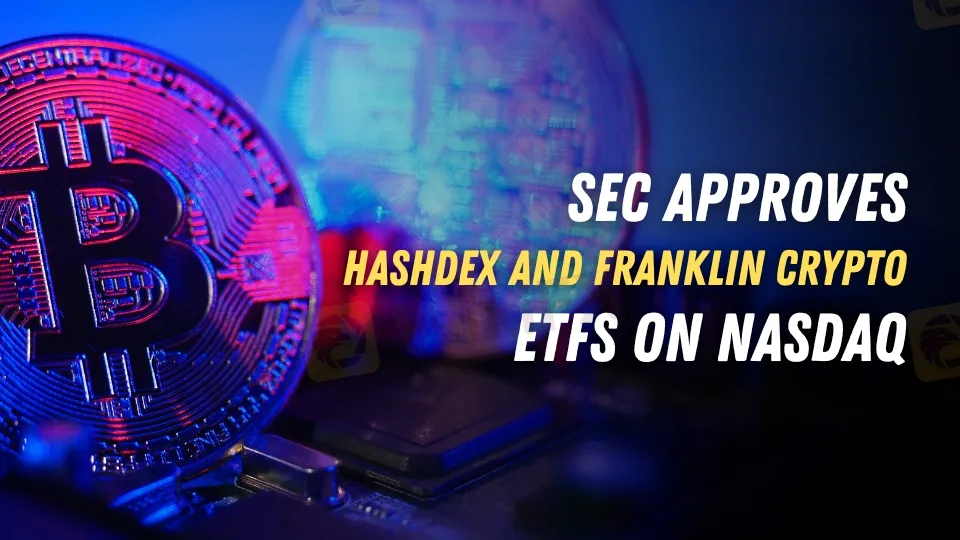简体中文
繁體中文
English
Pусский
日本語
ภาษาไทย
Tiếng Việt
Bahasa Indonesia
Español
हिन्दी
Filippiiniläinen
Français
Deutsch
Português
Türkçe
한국어
العربية
SEC Approves Hashdex and Franklin Crypto ETFs on Nasdaq
Abstract:The SEC has approved crypto index ETFs by Hashdex and Franklin Templeton, including Bitcoin and Ethereum, marking a milestone in crypto asset investment.

The United States Securities and Exchange Commission (SEC) has approved crypto index ETFs from Hashdex and Franklin Templeton, a significant step forward in the integration of digital assets into regular financial markets. These ETFs, which will be listed on the Nasdaq and Cboe BZX Exchanges, will focus on the two leading cryptocurrencies, Bitcoin and Ethereum.
Bitcoin and Ethereum Lead New Crypto Index ETFs
Hashdex and Franklin Templeton's crypto index ETFs will be split 80/20 between Bitcoin and Ethereum based on market size. This structure provides a balanced strategy for investors wanting exposure to the main cryptocurrencies. The Hashdex Nasdaq Crypto Index US ETF will be traded under the ticker “NCIQ,” while Franklin Templeton's ETF will be listed as “EZPZ.” Both funds are scheduled to begin in January 2025.
To boost investor confidence, the ETFs have collaborated with major custodians BitGo and Coinbase to provide secure asset management. Hashdex has also hinted at the idea of expanding its ETF to incorporate other cryptocurrencies, such as AVAX, LINK, and LTC, subject to regulatory permission.
SEC Approves Crypto Index ETFs, a Significant Step
This SEC clearance builds on the success of previous decisions to authorize spot Bitcoin and Ethereum ETFs. Industry analysts predict high demand for these diverse investment alternatives. According to Bloomberg's Eric Balchunas, this milestone highlights Hashdex and Franklin Templeton's expanding importance in the cryptocurrency market.

The overall cryptocurrency ETF market in the United States is quickly expanding. Bitcoin ETFs have received more than $36 billion in inflows, while Ethereum ETFs have received $2.4 billion. Franklin Templeton's Bitcoin and Ethereum spot ETFs alone generated $461.5 million and $41.5 million in net inflows, indicating investor interest in these assets.
Solana ETFs Face Regulatory Challenges
While Bitcoin and Ethereum ETFs are growing, Solana ETFs face serious obstacles. Earlier this year, the SEC denied essential 19b-4 filings required for Solana ETF certification, expressing concerns that Solana could be classed as a security. The approval process has stagnated due to a lack of filings, forcing issuers to reconsider their plans.
The SEC's cautious stance is consistent with its prior designation of Solana as a security in court papers. Market observers remain pessimistic that Solana ETFs would be approved by the present administration. According to Nate Geraci, president of The ETF Store, and Bloomberg Intelligence's James Seyffart, Solana ETFs may not be approved until 2025, depending on future changes in U.S. political and regulatory leadership.
Final Thoughts
The SEC's clearance of Hashdex and Franklin Templeton crypto index ETFs on Nasdaq demonstrates Bitcoin and Ethereum's growing acceptability in traditional financial markets. These ETFs provide investors with a secure and diverse method to interact with top cryptocurrencies. However, the regulatory constraints around Solana ETFs highlight the continued challenges to widespread crypto adoption in financial systems. As the crypto ETF landscape changes, Bitcoin and Ethereum remain at the forefront, laying the groundwork for future innovation in digital asset investment.

Disclaimer:
The views in this article only represent the author's personal views, and do not constitute investment advice on this platform. This platform does not guarantee the accuracy, completeness and timeliness of the information in the article, and will not be liable for any loss caused by the use of or reliance on the information in the article.
Read more

RM62k Lost Investment Scam After Joining XRP Community Malaysia on Telegram
A 30-year-old homestay manager from Chendering, Malaysia, fell victim to an online bitcoin investment scam, losing RM62,214.59. According to Kuala Terengganu police chief ACP Azli Mohd Noor, the incident unfolded after the victim joined a Telegram group named “XRP Community Malaysia” on December 19. The group promoted bitcoin investments allegedly powered by Artificial Intelligence (AI).

Russia Turns to Bitcoin for International Trade Amid Sanctions
Russian companies are increasingly using Bitcoin and other cryptocurrencies to bypass Western sanctions and facilitate international trade. The country's Finance Minister, Anton Siluanov, confirmed that cryptocurrencies mined in Russia are now being employed for foreign transactions under an experimental framework.

Robinhood Launches Options Trading in the UK by 2025
Robinhood to introduce options trading in the UK by 2025 following FCA approval. Discover how this expansion aligns with Robinhood's strategy for global growth and new features.

Hong Kong Stablecoins Bill Boosts Crypto Investments
Hong Kong's Stablecoins Bill sets regulatory standards for crypto issuers and platforms, aiming to protect investors and strengthen the city's crypto investment appeal.
WikiFX Broker
Latest News
Russia to Fully Ban Crypto Mining in 10 Regions Starting January 1, 2025
Why is there so much exposure against PrimeX Capital?
Two Californians Indicted for $22 Million Crypto and NFT Fraud
RM62k Lost Investment Scam After Joining XRP Community Malaysia on Telegram
Victims of Financial Fraud in France Suffer Annual Losses of at Least €500 Million
WikiFX Review: Is Ultima Markets Legit?
Colorado Duo Accused of $8M Investment Fraud Scheme
What Impact Does Japan’s Positive Output Gap Have on the Yen?
Macro Markets: Is It Worth Your Investment?
Malaysia Pioneers Zakat Payments with Cryptocurrencies
Currency Calculator


